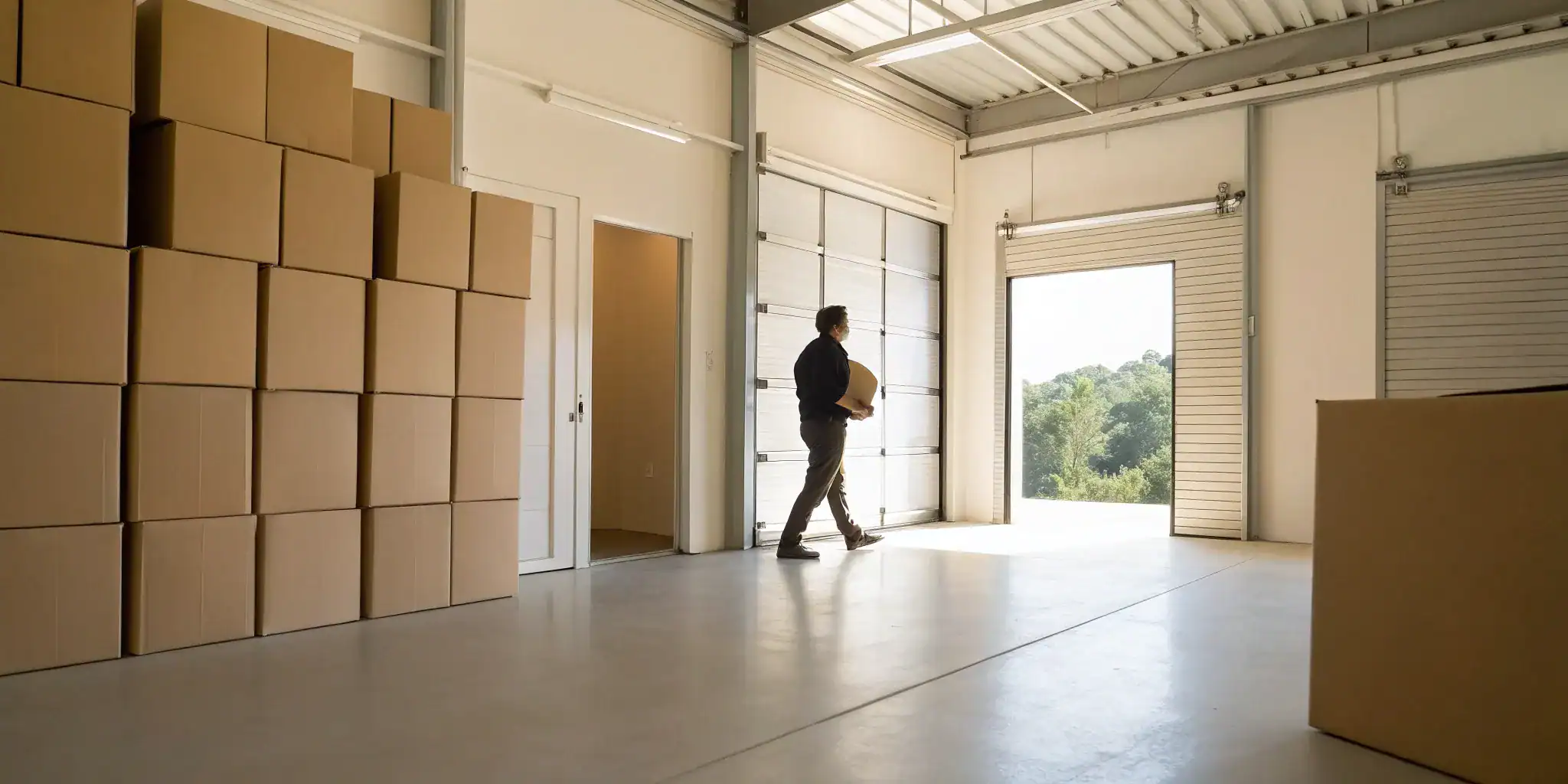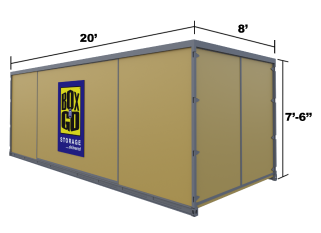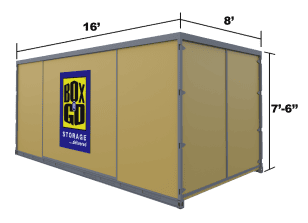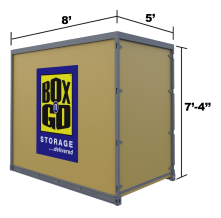Business Self Storage Near Me: How to Choose the Best

When you run out of space, the traditional solution involves renting a truck, loading all your items, driving to a facility, and then unloading everything into a unit. It’s a time-consuming process that forces you to handle everything twice. But what if there was a better way? Modern storage solutions are designed for business efficiency. Instead of you going to the storage, the storage comes to you. Your search for business self storage near me should lead you to an option that saves you work, not creates more of it. Let’s explore the different types of storage available so you can make a choice that saves you time, money, and a lot of hassle.
- Save 50% on move-in
- No truck rental
- Ground level










- Save 50% on move-in
- No truck rental
- Ground level
Box-n-Go Portable Storage Unit Sizes

Key Takeaways
- View Storage as a Growth Partner: A storage unit is more than just extra space—it’s a cost-effective way to scale your business. Use it to manage inventory, equipment, and documents without committing to a pricey commercial lease, giving you the flexibility to grow on your terms.
- Choose a Method That Saves You Work: Your time is your most valuable asset. Opt for a storage solution like portable containers that brings the unit to you. This cuts out truck rentals and loading or unloading twice, streamlining your logistics so you can focus on your business.
- Organize for Quick Access: A messy unit wastes time and causes frustration. Create a system from day one by using shelves to build vertically, labeling every box, and leaving an aisle for easy movement. An organized space means you can find what you need, when you need it.
Is Self-Storage the Right Move for Your Business?
As your business grows, so does your need for space. Suddenly, the office stockroom is overflowing, your home garage is packed with inventory, and finding that one important file feels like an archeological dig. Before you start looking at expensive commercial leases, consider a more flexible and affordable solution: self-storage. Using a storage unit for your business isn’t just about stashing extra stuff; it’s a strategic move that can save you money, improve your efficiency, and give you the room you need to scale. Let’s look at how self-storage can support your business goals.

Solve Your Space Challenges
Renting a larger office or warehouse is a major financial commitment, often locking you into a long, fixed lease. Self-storage offers a practical alternative. It’s significantly cheaper than commercial real estate, allowing you to get the extra space you need without the hefty price tag and long-term commitment. Most storage facilities offer flexible, month-to-month leases, so you can adjust your space as your needs change. This gives you a low-risk way to manage your space requirements, whether you’re dealing with a temporary overflow or need a more permanent solution for your business storage.
Securely Store Inventory and Equipment
If you run an e-commerce store, a construction business, or a retail shop, you know how quickly inventory and equipment can take over your primary workspace. A self-storage unit provides a secure, off-site location to keep extra products, materials, and tools. This not only frees up valuable room at your main location but also helps protect your assets from theft or damage. By moving non-essential items to storage, you can create a more organized and productive environment for your daily operations, ensuring your workspace is used for what it does best: running your business.

Organize and Archive Important Documents
Piles of paperwork and rows of filing cabinets can consume a surprising amount of office space. Many businesses are required to hold onto physical documents like tax records, invoices, and client files for several years. Instead of letting them clutter your workspace, you can use a storage unit as a secure, off-site archive. This helps you maintain a tidy and efficient office while ensuring your important documents are safely stored and accessible when you need them. It’s a simple way to organize your business and make room for more productive activities.

Handle Seasonal Inventory Swings
Does your business deal with seasonal demand? Many companies, from retailers stocking up on holiday decorations to landscapers storing snow blowers in the summer, face fluctuating inventory needs. A self-storage unit is the perfect solution for managing these swings. You can store seasonal items securely during the off-season, freeing up valuable floor space in your shop or warehouse. When the season rolls around again, you can easily access what you need. This flexible approach means you only pay for the space when you need it, making it a cost-effective way to handle seasonal inventory.
Grow Your Business Without Growing Your Rent
One of the biggest hurdles to scaling a business is the cost of expanding your physical footprint. Self-storage acts as a bridge, allowing you to grow your operations without immediately committing to a larger, more expensive commercial space. You can use a unit to hold more inventory, stage equipment for bigger jobs, or manage materials for expansion. Many providers aim to be a cheaper option than renting a new office or warehouse. This gives you the flexibility to test new growth strategies and increase your capacity at a fraction of the cost, supporting your business’s journey to the next level.
Store on your driveway or inside our secure facility. Load/unload only once. Ground level access.
How to Choose the Right Storage for Your Business
Finding the right storage solution is a big step in streamlining your operations. It’s about more than just finding a space; it’s about finding a partner that makes your workflow easier. Whether you’re storing inventory, archiving documents, or stashing equipment, the right choice can save you time, money, and a lot of headaches. Let’s walk through the key factors to consider so you can find the perfect fit for your business needs.

Traditional Storage vs. Portable Containers
Your first big decision is choosing between a traditional storage facility and a portable storage container. With a traditional unit, you pack a truck, drive to the facility, and unload everything into your space. It’s a familiar process, but it means handling your items multiple times.
Portable containers flip the script. A container is delivered directly to your business, allowing you to load it at your own pace, right at your doorstep. This eliminates the need for a rental truck and cuts your loading and unloading work in half. For businesses that value efficiency, the convenience of portable storage is a game-changer, simplifying logistics so you can focus on what you do best.
When to Consider Warehouse Storage
If your business is scaling quickly and you’re outgrowing a standard storage unit, warehouse storage might be your next step. This option is ideal for businesses managing large quantities of inventory, bulky equipment, or palletized goods. Think of it as a middle ground between a self-storage unit and leasing your own commercial warehouse. It offers more space and often includes features like loading docks and higher ceilings. Many business storage providers offer warehouse-style spaces as a more affordable alternative to a long-term commercial lease, giving you room to grow without the hefty price tag.

Do You Need a Climate-Controlled Unit?
This question is crucial for protecting your assets. A climate-controlled unit maintains a consistent temperature and humidity level, shielding your items from extreme heat, cold, and moisture. If you’re storing anything sensitive, this is a non-negotiable feature. Consider a climate-controlled unit for items like electronics, wood or leather furniture, important documents, pharmaceuticals, or textiles like clothing and upholstery. The extra investment protects your inventory from damage like warping, mildew, and rust, ensuring your products remain in perfect condition.
Comparing Top Storage Providers
The right storage company for you depends entirely on your business’s unique needs. Some prioritize convenience, while others focus on specialized features or security. Here’s a quick look at what some of the top providers offer.
- Call or order online in minutes
- We deliver storage to you
- Pack at home, at your convinience
- Store on your property or at indoor facility
- Move locally or nationwide
- Call or order online in minutes
- We deliver 16′ and 20′ storage to you
- Pack at home, loading labor available
- Store on your property
- Secured Extra Space
Box-n-Go
Box-n-Go specializes in portable storage containers delivered right to your location. This model is built for maximum convenience, saving you from renting a truck and double-handling your items. You can keep the container on-site for easy access or have it moved to a secure storage facility. It’s an incredibly flexible solution for businesses that need to load inventory, documents, or equipment directly from their office or storefront.

Public Storage
Public Storage offers a wide range of unit sizes and caters specifically to commercial clients. They serve many types of businesses, from construction and retail to e-commerce and pharmaceuticals. With locations across the country, they are a reliable option if you need a standard, drive-up unit and have the means to transport your items to their facility.
Extra Space Storage
If you’re looking for variety, Extra Space Storage has it. They offer everything from small lockers to large warehouse-sized spaces. Some locations even provide office space rentals alongside storage, which can be useful for small businesses needing a combined workspace and inventory solution. Their offerings are broad, making them a potential fit for many different commercial storage needs.

20’ Container – all weather.
Perfect for 3-bedroom residence.
5-7 rooms, furniture, appliances, etc.

16’ Container – all weather.
Perfect for 2-bedroom residence.
3-5 rooms, furniture, appliances, etc.

8’ Container – all weather.
Modular – works for any need.
Each fits 1-1.5 rooms.
U-Haul
While known for moving trucks, U-Haul also provides robust business storage options. Their major selling point is security. Many of their facilities feature electronic gate access, individual unit alarms, and video surveillance to keep your business assets safe. This makes them a strong contender if you’re storing high-value equipment or inventory and security is your top priority.
CubeSmart
CubeSmart is known for its clean facilities and customer-focused approach. They offer a variety of storage solutions for businesses, including climate-controlled units and flexible month-to-month leases. Many of their locations also offer amenities like free Wi-Fi and workspaces, which can be a nice perk for business owners who need to get work done while visiting their unit.
Key Features to Look For in Business Storage
When you’re choosing a storage solution for your business, you’re not just looking for a spare room—you’re looking for a partner in your operations. The right storage can streamline your workflow, protect your assets, and give you the flexibility to grow. But with so many options out there, it’s easy to get overwhelmed. The key is to focus on the features that directly impact your daily efficiency and bottom line.
Think beyond just the monthly price tag. Consider how you’ll be using the space. Will you need frequent access? Are you moving heavy or bulky items? Do you need a secure spot for deliveries? Answering these questions will help you create a checklist of must-haves. From security protocols to how you physically get your items into the unit, every detail matters. Let’s break down the essential features to look for so you can find a storage solution that truly works for your business.
Convenient Location and Access Hours
For a business, time is money, and driving across town to a storage facility can eat into both. Traditional storage facilities often have set access hours, typically from early morning to late evening, with some offering 24-hour access for a higher fee. If your business operates outside of a standard 9-to-5, you’ll need to confirm that their hours align with your schedule.
An even more convenient option is a portable storage container delivered directly to your location. This approach completely eliminates travel time, giving you 24/7 access right outside your door. For items you need to store off-site, companies like Box-n-Go bring your loaded container to a secure warehouse. You can still access your belongings when you need to, but the initial move-in is handled with maximum efficiency.
We deliver the best storage solutions. No gimmicks:
- No truck to rent. We deliver storage to you!
- Load/Unload only once.
- Pay only for space you use.
- Secure, climate-friendly facility.
- Drive-up access
No Truck to rent…EVER!
- Save money and time.
- Reduce the risk of accidents and injuries.
- No need to pay for gas, insurance & mileage!
Load ONCE Storage Solution!
- You only need to load your belongings once!
- No need to load and unload it all again into a storage unit.
- All containers come with easy ground level access!
Pay Only for the Space You Use!
(if storing at our facility)
- No not need to guess on how much space you actually need.
- Order an extra 8’ x 5’ unit. Do not use it – do not pay for it.
Secure, Climate-Friendly Facility!
- Highest degree of security and protection.
- Our 8’ x 5’ units are breatheable – no mold or mildew.
- No funky smell when your belongings return.
EASY Drive-Up Access!
(if storing at our facility)
- Access your units at ground level.
- No elevators, ramps, stairs to climb.
- Schedule access appointment & drive straight to your units.
Top-Notch Security Features
Protecting your inventory, equipment, and documents is non-negotiable. When evaluating a storage facility, look for a multi-layered security system. Standard features should include perimeter fencing, electronic gate access, good lighting, and 24/7 video surveillance. Some facilities also offer individually alarmed units for an extra layer of protection. Don’t hesitate to ask the site manager about their specific security measures.
Portable storage containers offer a different kind of security. The container itself is a robust, weather-resistant steel box that you secure with your own lock. When the unit is at your business, you control the security environment. If it’s stored at a central warehouse, it benefits from the facility’s overarching security systems, keeping your assets safe indoors and away from public view.

Easy Loading and Unloading
Think about the physical labor involved in moving your items. Many traditional storage units are located down long hallways or on upper floors, requiring you to use elevators and push heavy carts. Even drive-up units can be limiting. This process isn’t just tiring; it’s inefficient and increases the risk of damaging your goods.
This is where portable storage truly changes the game. A container is delivered and placed at ground level, allowing you to walk right in. There are no ramps to climb, no carts to push, and no elevators to wait for. You can load your items directly from your business, cutting your loading time and effort in half. This ground-level access simplifies the entire process, especially for businesses dealing with heavy equipment or frequent inventory turnover.
Finding the Right Unit Size
Choosing the correct unit size is crucial for managing costs and staying organized. Renting a space that’s too large means you’re paying for air, while a unit that’s too small can lead to a cluttered, inefficient mess. Traditional facilities offer a wide range of sizes, from small 5×5 lockers to large 10×20 units that can hold the contents of a small office.
Before you commit, take inventory of what you need to store. A good provider will have a storage unit guide to help you visualize how your items will fit. With portable storage, you can often order multiple containers if needed, giving you the flexibility to separate inventory, documents, and equipment. This modular approach helps you create a more organized system that can scale with your business.

Amenities That Help Your Business Run
Some storage facilities offer business-focused amenities to make your life easier. These can include on-site business centers with Wi-Fi, use of moving dollies and carts, and even conference rooms you can book. While helpful, these perks are often tied to a physical location you have to travel to.
With portable storage, the primary amenity is the service model itself. Having a storage unit delivered to you saves countless hours of travel and labor, which is often more valuable than on-site Wi-Fi. The ability to keep your storage on-site for as long as you need provides unmatched flexibility for projects, seasonal inventory, or renovations. It’s an amenity that integrates directly into your business operations, rather than one you have to go out of your way to use.
Package Acceptance Services
If you run an ecommerce business or receive frequent deliveries, managing packages can be a logistical challenge. Some traditional storage facilities solve this by offering package acceptance services, where they sign for your deliveries and place them securely in your unit. This is a fantastic service that prevents missed deliveries and keeps your inventory safe.
A portable container kept at your business location offers a powerful alternative. You can grant access to your trusted delivery drivers, allowing them to place packages directly inside your secure container. This creates a dedicated, on-site receiving hub, ensuring your deliveries are protected from weather and theft the moment they arrive, without needing a staff member to be present for every drop-off.
How to Manage Your Storage Unit Like a Pro
Once you’ve chosen your storage unit, the next step is to use it effectively. A well-managed unit is more than just a place to stash things; it’s an extension of your business operations. Treating it with the same care you give your main workspace will save you time, money, and countless headaches down the road. It’s all about creating a system that works for you, from budgeting and insuring your items to organizing the space so you can find what you need, when you need it. A little planning upfront makes a world of difference, turning your storage unit into a streamlined, efficient asset for your business.

Plan Your Storage Budget
Before you sign a lease, it’s important to work the cost of storage into your business budget. Think of it as an operational expense, just like rent or utilities. Start by researching the average prices for business storage units in your area to get a baseline. Remember to account for more than just the monthly rent; factor in potential costs for insurance, packing supplies like boxes and shelving, and any moving expenses. Having a clear budget helps you choose a unit that fits your financial plan without any surprises, ensuring your storage solution supports your business growth instead of straining it.
Understand Monthly Rates and Hidden Fees
The advertised monthly rate is just the starting point. To avoid unexpected charges, ask the facility manager for a complete breakdown of all potential fees. Are there one-time administrative fees when you sign up? What are the penalties for a late payment? Does the company have a history of raising rates after an initial promotional period? Understanding the full cost is essential for accurate budgeting. Many companies offer various commercial storage options, so be sure to compare not just the monthly price but the overall value and transparency of their fee structure.
Get the Right Insurance Coverage
Don’t assume your existing business insurance policy covers items kept off-site. Most of the time, it doesn’t. Your belongings in a storage unit represent a significant investment, whether it’s inventory, equipment, or important documents. That’s why you need to get insurance for your storage unit to protect your assets. Most storage facilities offer their own insurance plans, or you can find a third-party provider. Review the policy carefully to understand what’s covered—things like fire, theft, and water damage are standard—and make sure the coverage amount is enough to replace everything you’re storing.

Create an Organization System That Works
An organized storage unit will save you an incredible amount of time. Before you move anything in, sketch out a simple floor plan. Place bulky, less-frequently used items at the back and create a clear aisle down the middle for easy movement. Keep items you’ll need often near the front for quick access. Use sturdy, clear plastic bins or label all your boxes on multiple sides. Investing in some freestanding shelving units can also be a game-changer, allowing you to use vertical space and keep things off the floor. A good system means you can take advantage of convenient access hours without wasting a minute searching.
Track Your Inventory with Ease
Knowing exactly what’s in your storage unit is crucial for efficient business operations. A simple inventory system can prevent you from buying duplicate supplies or struggling to locate a specific item. You can create a master list using a spreadsheet or a dedicated inventory app. For a more detailed approach, number each box and list its contents on your master sheet. Some people even take photos of the contents before sealing a box. Since self-storage is cheaper than renting more office space, keeping your inventory organized ensures you’re getting the maximum value from that cost-saving decision.
Maximize Every Square Foot of Your Space
To get the most out of your monthly rent, you need to use your space wisely. Think vertically. Use tall, sturdy shelving units to stack boxes and bins safely. Disassemble furniture like desks and tables to store them more compactly. Use uniform-sized boxes whenever possible, as they are much easier to stack securely than a random assortment of sizes. Look for empty spaces you can fill, like inside wardrobes or under desks. By carefully planning your layout and using smart packing strategies, you can often fit more than you think, potentially allowing you to rent a smaller, less expensive unit or avoid needing a second one as your business grows.

Get the Most Out of Your Storage Investment
Using a storage unit for your business is a savvy move, but it’s more than just an extra closet. To truly get your money’s worth, you need to treat it as an extension of your workspace. A well-managed storage unit can streamline your operations, protect your assets, and give you the flexibility to grow. It’s all about being intentional with how you use the space.
Thinking ahead about security, organization, and the rules of your rental agreement will save you major headaches down the road. By implementing a few smart strategies, you can transform your storage unit from a simple holding space into a powerful business tool. Let’s walk through the key steps to make sure your storage solution is working as hard as you are.
Follow Key Safety Guidelines
When you’re storing business inventory, equipment, or important documents, security is non-negotiable. Look for a storage facility that takes safety seriously. Most modern facilities offer features like 24/7 security cameras, gated properties with personal access codes, and good lighting to keep your items safe. But their security measures are only half of the equation.
You also have a role to play. Always use a high-quality, tamper-resistant lock on your unit—this is your first line of defense. Be careful about who you give your access code to, and keep a record of anyone who has it. A secure facility provides peace of mind, but your own careful habits are what truly protect your business assets.
Know What You Can and Can’t Store
Before you move a single box, make sure you understand the facility’s rules. While storage units are incredibly versatile, they aren’t a free-for-all. For liability and safety reasons, you generally can’t store hazardous materials, flammable liquids, perishable food, or illegal items. It’s also important to remember that you cannot run your business directly from the unit, which means customers can’t come there to shop.
If you have sensitive items like electronics, pharmaceutical samples, or important paperwork, consider a climate-controlled unit to protect them from extreme temperatures and humidity. Always ask the facility manager for a complete list of prohibited items. Following the rules protects your inventory, the facility, and other renters.

Plan Your Trips for Maximum Efficiency
Time is money, so every trip to your storage unit should be as quick and productive as possible. An organized unit is key. Before you even start loading, create a simple map of where everything will go. Place items you’ll need frequently near the front for easy access. Clearly label every box on multiple sides so you can identify the contents at a glance.
If you know you’ll be loading and unloading often, a traditional drive-up unit can be a good choice. For ultimate convenience, a portable storage container delivered to your location eliminates travel time altogether. You can load everything at your own pace right at your business, and then have the container moved to a secure facility. This approach simplifies logistics and lets you focus on running your business, not your errands.
Understand the Fine Print: Leases and Liability
The rental agreement might not be the most exciting document, but reading it carefully is essential. It outlines your rights and responsibilities, as well as the facility’s. Pay close attention to the payment schedule, rules for accessing your unit, and the process for moving out. The good news is that most facilities offer flexible, month-to-month leases, so you aren’t locked into a long-term commitment.
Also, clarify the rules on things like your business address—you typically cannot use the storage unit’s address as your official mailing address. Finally, talk to your business insurance provider to make sure your stored items are covered. Most storage facilities offer their own insurance, but your existing policy might provide better coverage.
Scale Your Storage as Your Business Grows
One of the biggest advantages of using self-storage is its flexibility. As your business evolves, your storage needs will change, and your storage solution should be able to keep up. Whether you’re dealing with a seasonal influx of inventory or expanding your product line, you can easily adjust your space. Many facilities allow you to switch to a larger or smaller unit without a lot of hassle.
This scalability is a huge benefit for small businesses and startups. It allows you to access the space you need without committing to an expensive, long-term commercial lease. You can test new products, buy inventory in bulk to get better pricing, or simply clear out clutter from your primary workspace. Storage gives you the room to grow your business on your own terms.
Simple Tips for a Streamlined Process
Making your storage unit work for you comes down to a few simple habits. First, think vertically. Use sturdy, freestanding shelves to take advantage of the unit’s full height and keep items off the floor. This not only maximizes your space but also makes it easier to see and access everything. Leave a small aisle down the middle so you can walk to the back of the unit without having to move stacks of boxes.
Consider using clear plastic bins for smaller items so you can see what’s inside without having to open them. Keeping a digital inventory with photos can also be a lifesaver. By treating your storage unit like a well-organized warehouse instead of a junk drawer, you’ll create a functional space that supports your business operations and saves you valuable time.
Related Articles
- Self Storage for Business: A Complete Guide – Box n Go Storage and Moving
- Types of Business Storage & Warehouse Solutions Explained – Box n Go Storage and Moving
- The Ultimate Guide to Business Storage Units – Box n Go Storage and Moving
Frequently Asked Questions
Can I run my business or meet clients at my storage unit? This is a common question, and the short answer is no. Storage facilities are designed for storing items, not for conducting business operations like retail sales or client meetings. Lease agreements almost always prohibit using the unit as a primary place of business. Think of it as your off-site stockroom or archive, not a second office or storefront.
Is a portable container better than a traditional storage unit for a business? It really depends on your workflow. If you need to move a large volume of items at once and want to avoid the hassle of renting a truck and loading/unloading multiple times, a portable container is a huge time-saver. The ground-level access is also a major plus for heavy or bulky items. A traditional unit might work if you only need to access small things occasionally and the facility is very close to your business.
How much can I really save by using storage instead of a larger commercial space? The savings can be significant. Commercial real estate comes with long-term leases, high monthly rates per square foot, and often includes extra costs like utilities and maintenance fees. Self-storage, on the other hand, operates on flexible month-to-month leases at a fraction of the cost. It allows you to get the space you need to grow without taking on the financial risk and commitment of a bigger commercial lease.
What kind of security should I actually look for? Look for a facility with multiple layers of security. At a minimum, this includes a fully fenced perimeter, electronic gate access that requires a personal code, and plenty of bright lighting. Video surveillance is also a standard feature you should expect. For your own peace of mind, always use a high-quality disc or cylinder lock on your unit, as they are much harder to tamper with than standard padlocks.
Do I really need climate control for my business inventory? If you’re storing anything that could be damaged by extreme heat, cold, or humidity, then yes, it’s a worthwhile investment. This includes items like electronics, wood furniture, important paper documents, pharmaceutical samples, or textiles. A standard unit is fine for tools or sturdy equipment, but climate control protects your more sensitive and valuable assets from things like rust, mildew, and warping.

